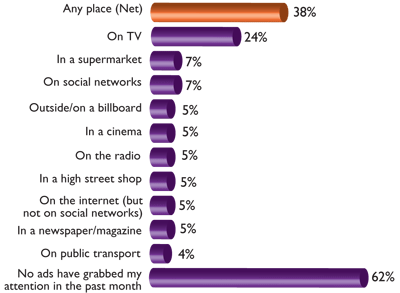With a plethora of information coming from traditional media, new media and word of mouth, brands that develop relevant messaging will appeal to mums.
This post is by Louise Twycross-Lewis, MEC.
Brands and marketers have long been attracted to the purchasing influence mums have on their households. With approximately 7 million mums in the UK, with children aged 15 and under in their households (source: GB TGI 2015 Q3), they are a sizeable chunk of the population. While it cannot be claimed that this audience is ignored, it is clear that brands are not always speaking to them in the right way.
Mintel's Marketing To Mums report details mothers' attitudes towards advertising, the role that the internet and social media has in their purchasing journeys, and highlights some of the ways of marketing to mums today.
Advertising appears to be achieve low levels of standout among mums overall, with less than one in four saying that they have noticed an ad that really grabbed their attention in the past month. TV ads are the most likely to grab mums' attention. Many mums feel advertising fails to present an accurate picture of family life. 62% believe the way parents are portrayed is unrealistic and an Ipsos/Saatchi & Saatchi survey revealed that only 19% believe there are any examples of mums in advertising that they can relate to. The popularity of Fiat's 'The Motherhood' campaign in 2012, which featured a mum rapping about the impact parenthood has had on her life shows how the realities of family life resonate more than the aspirational side.
Today's advertising misses the mark for most mums
Base: 1,000 female internet users aged 16+ who are parents of children aged 0–15 living with them
'Thinking about the past month, have you noticed/heard any ads that really grabbed your attention? If so where did you notice/hear them?
Select all that apply'

Mintel's report stresses that advertising needs to speak to mums as ordinary people with specific concerns, without patronising or stereotyping parents. This lack of reality in the portrayal of parenthood may play a large role in undermining the level of trust mums place in the advice given by advertising.
Word of mouth is key – on- and offline
For mums, traditional media sources pale in significance compared to recommendations from parents, friends and medical professionals for helping with their purchase decision-making. The internet and social media also play a significant role in providing mothers with information on how best to meet the needs of their family. Online communities, consumer reviews and parenting blogs enjoy higher levels of trust, compared with TV shows, magazines and books that target parents. The popularity of online parenting communities like Netmums and Mumsnet show that parents, (and new mums in particular), are information-hungry and drawn to the support of other parents online. The ability to access information quickly, compare prices and make purchases any time of day, also appeals greatly to time-poor mums.
The audience is proficient on social media – 81% regularly use Facebook and 49% regularly use YouTube. The fact that these sites enable mums to enjoy all the things they care about (fashion, beauty, food, etc.) as well as parenting advice appeals to many; three in 10 agree they are 'me first and then a mum' (source: Ipsos/ Saatchi & Saatchi survey, Mumstock 2014). It is important to them that the media and advertising they consume reflects this.
The internet plays a key role in mums' purchase journeys
Over 60% of mums would try to find more information about a product they really like online and compare its prices online, and 56% would also read online product reviews. It is important to note that the absence of information can be as disadvantageous as negative feedback/reviews. With mums using traditional media, new media and word of mouth to make their purchasing decisions, brands have many opportunities to reach them. However, with these sources comes a plethora of information. Brands that invest in relevant, relatable messaging that simplifies the decision-making journey will win over this audience.

